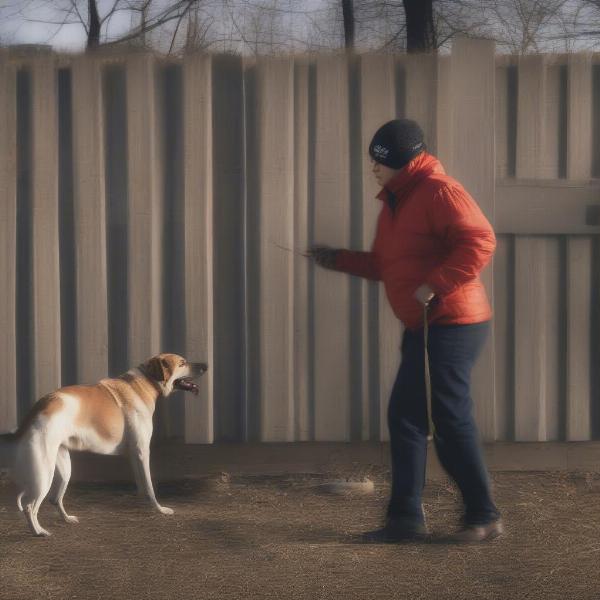Dog bites can be a traumatic experience, leaving victims with physical and emotional scars. In Illinois, the law surrounding dog bites aims to protect victims and hold owners accountable. This article provides a comprehensive overview of Illinois’ dog bite statute, exploring its key provisions, exceptions, and the steps you can take if you or someone you know has been bitten.
Strict Liability in Illinois: Holding Owners Responsible
Illinois follows a strict liability law when it comes to dog bites. This means that an owner is liable for injuries caused by their dog, regardless of whether they knew the dog was aggressive or had a history of biting. This removes the need for the victim to prove negligence on the part of the owner. Simply put, if the victim was lawfully on the property and provoked the dog, the owner is responsible for the damages caused by the bite.
Exceptions to the Rule: When is an Owner Not Liable?
While Illinois law leans towards strict liability, there are some exceptions. If the victim was trespassing or provoking the dog, the owner might not be held responsible. Provocation can include teasing, tormenting, or abusing the dog. It’s important to note that simply approaching a dog, even in a friendly manner, is not usually considered provocation.
 Illinois Dog Bite Law – Exceptions
Illinois Dog Bite Law – Exceptions
What to Do After a Dog Bite in Illinois: Seeking Legal Recourse
If you are bitten by a dog in Illinois, it’s crucial to take immediate action:
- Seek Medical Attention: Your health is paramount. Even seemingly minor bites can lead to infections.
- Document the Incident: Take photos of the bite, gather contact information from the dog owner and any witnesses, and report the incident to animal control.
- Consult with an Attorney: illinois dog bite laws can be complex. A qualified attorney specializing in dog bite cases can help you navigate the legal process and protect your rights.
- Preserve Evidence: Keep any clothing or belongings that were damaged during the attack.
Understanding “One-Bite” Rule Misconceptions
Contrary to popular belief, Illinois does not have a formal “one-bite” rule. This myth suggests that an owner is only liable after their dog has bitten someone before. The strict liability statute makes owners responsible for the first bite and any subsequent bites, unless an exception applies.
Navigating the Legal Landscape: Seeking Compensation for Damages
Victims of dog bites in Illinois can seek compensation for various damages, including medical expenses, lost wages, pain and suffering, and emotional distress. The amount of compensation will vary depending on the severity of the injuries and other factors. An attorney can help you determine the full extent of your damages and build a strong case. For more information on finding a lawyer in your area, you might consider consulting a champaign dog bite lawyer.
Conclusion: Protecting Yourself and Your Rights
Understanding Illinois law on dog bites is essential for both dog owners and potential victims. Owners must take responsibility for their dogs’ actions, while victims should be aware of their rights and the steps they can take to seek compensation for their injuries. By being informed and proactive, you can help create a safer environment for everyone.
FAQs:
- What if the dog bite occurred on the owner’s property? If you were lawfully on the property (e.g., a guest, mail carrier), the owner is likely liable.
- Can I sue if the dog bite didn’t break the skin? Yes, even bites that don’t cause significant physical injury can be grounds for a lawsuit, especially if they result in emotional distress or other damages.
- How long do I have to file a dog bite lawsuit in Illinois? The statute of limitations for dog bite cases in Illinois is generally two years from the date of the incident.
- What if the dog belongs to a friend or family member? The law applies regardless of your relationship with the dog owner.
- What if the dog was provoked by another dog? The owner of the biting dog is still likely liable, as they are responsible for their dog’s behavior.
- Are there specific breeds that are considered inherently dangerous under Illinois law? While Illinois law does not specifically label breeds as inherently dangerous, some local ordinances might have breed-specific regulations.
- What happens if the dog owner doesn’t have insurance? You can still pursue a lawsuit against the owner personally.
ILM Dog is a global online resource dedicated to providing dog owners with reliable, practical advice on all aspects of canine care, from breed selection to senior dog care. We believe that informed dog owners are better equipped to provide their furry companions with the happy, healthy lives they deserve. Contact us at [email protected] or +44 20-3965-8624. ILM Dog offers expert guidance on dog breeds, health, training, nutrition, grooming, and much more.